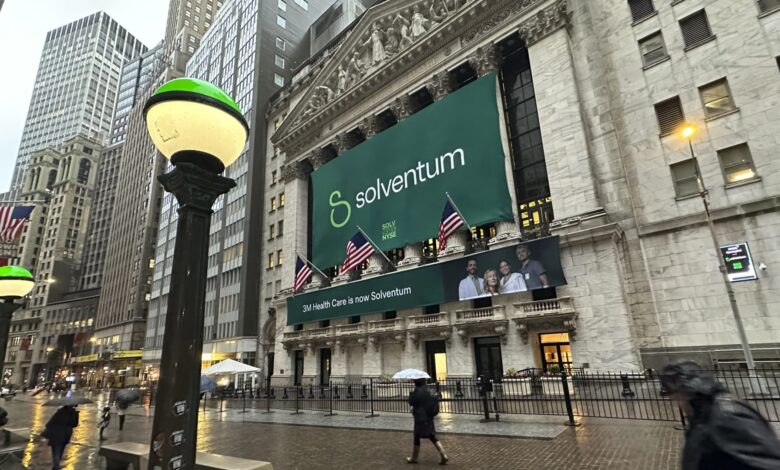Trian Activists Have Several Levers to Create Shareholder Value at Solventum

People walk past the New York Stock Exchange on Wednesday, April 3, 2024 in New York.
Peter Morgan | AP
Company: Solventum (SOLV)
Business: Solventformerly known as 3M Health Care, is a global healthcare company that was spun off from 3M ABOVE April 1. It has four main segments. First, there is Medical Surgical, a provider of solutions including advanced wound care, sterilization assurance, temperature management, surgical supplies, stethoscopes, and medical electrodes. There is the Dental Solutions segment, which offers dental and orthodontic products and dental adhesives that extend the life of teeth. The Health Information Systems segment offers software solutions for healthcare systems, including computer-aided physician documentation, direct-to-bill and coding automation, speech recognition, and data visualization platforms. Finally, the Purification and Filtration segment offers filters, purifiers, cartridges, and membranes.
Stock market value: $9.95 billion ($57.63 a share)

SOLV Performance in 2024
Activist: Trian Fund Management
Ownership ratio: Not available
Average costs: Not available
Activist Comments: Trian operates a concentrated portfolio of eight to ten mid- to large-cap public companies where the firm actively participates in the management of the companies with the goal of enhancing long-term shareholder value. Trian, managed by Nelson Peltz, takes very few positions, but is very active in the positions it does take. Peltz calls his formula “operational activism.” He defines it as working with the management of high-potential but underperforming companies to increase earnings by cutting overhead costs, cutting ancillary businesses, and polishing up strong brands.
What is happening
Bloomberg News reported on July 22 that Trian had taken a position at Solventum.
Behind the scene
Solventum is a global healthcare company that was spun off from 3M on April 1, with 80.1% of the shares distributed to 3M shareholders and the remaining 19.9% retained by 3M to be monetized within five years of the transaction. Solventum has market leadership in multiple categories, strong products that drive performance, and high brand loyalty. The company operates in four segments that will account for $8.2 billion in revenue by 2023: Medical Surgical (56.5%), Dental Solutions (16.2%), Health Information Systems (15.7%), and Filtration & Purification (11.6%). The healthcare business has consistently been one of 3M’s strongest segments since it was part of the conglomerate structure, boasting the highest growth rate of any division and margins that exceed the company average. The business has grown organically every year for more than two decades. In addition, the company has had adjusted operating margins of 25% or higher and generated more than $1.4 billion in free cash flow in each of the past three years. Even so, the stock has not performed well since the spinoff, falling more than 20% since the close of its first trading day until news of Trian’s position broke.
As a standalone company, Solventum has been misunderstood and under-covered by the market. Although it is a spin-off from a conglomerate, Solventum itself is a small conglomerate with four different businesses. While all are healthcare-related, none of them really share the same technology, customers, supply chain, or distribution. As such, it is a difficult company for investors and sellers to analyze, and it has not received much attention in the investment community. But as a newly independent company, there are potential incentives inherent in most spin-offs, such as greater management focus and flexibility, and the ability to better align management compensation with the value of the business.
Solventum also has several levers to create value, namely re-accelerating organic growth, restoring margins while investing to drive growth, and simplifying its portfolio of businesses. Starting with organic growth, Solventum has demonstrated the ability to deliver low-to-mid single-digit growth at 3M for years while being constrained by its conglomerate structure. As a pure play, the company should have more flexibility to execute growth initiatives, and simply returning growth to 4% would create value in a sell-side consensus environment of no growth. In terms of margins, the company has a 25% EBIT margin, which is strong but could be better. That margin includes the 800 basis points of corporate expenses allocated to these businesses as part of 3M. As a standalone entity, the company would need to rework some of these functions, but it could also cut a lot of major costs through management discipline. Finally, simplify the portfolio. Again, as a small conglomerate, Solventum has one core business and three non-core, non-synergistic businesses with different products, sales forces, customers, manufacturing, and distribution. The company’s segments could potentially have the scale to become standalone companies and trade at higher pure-play valuations or be sold to a private equity firm or strategic buyer. Selling any of these businesses would allow the company to deleverage its balance sheet, which is currently trading at 4x net leverage, and start paying dividends. There is no reason why the company should trade at a lower price-to-earnings ratio than its peers. Certainly, the company should not trade cheaper than 3M, as it has historically been one of 3M’s best businesses.
Trian is known for being a skilled earnings analyst and has helped many companies improve their margins and grow. Look no further than the coffee mugs in the company’s offices that read “Sales up, Costs down.” There is also no shortage of examples of Trian being a value investor with a strong corporate governance focus and creating tremendous shareholder value from the board level. But what some may not realize is that the company also has extensive experience with subsidiaries, such as: (i) Pentair, Detached nVent Electric plc in 2018; (ii) Kraft Foods moved to split into two companies in 2012 and changed its name Mondelez; (iii) Dupont byproduct Dow in 2019; (iv) Cadbury’s byproduct of Dr. Pepper; and (v) Ingersoll Rand byproduct Allegion in 2013, to name a few. The most relevant spin-off, however, is GE’s healthcare division. Trian has been an active shareholder in General Electric since 2015, calling for both operational and strategic improvements. On January 4, 2023, GE spun off its GE HealthCare division, as part of a plan to break into three separate companiesSince then, GE HealthCare Technologies has returned 34.45% compared to the Russell 2000’s return of 26.92% over the same period.
While Trian has a history of being an activist shareholder, it has also created significant shareholder value as an active director. We believe the latter is appropriate in this situation. There is no activist more experienced than Trian in participating in a spin-off and addressing the issues and opportunities inherent in spin-offs. Furthermore, if the opportunity arises to divest one or more businesses, shareholders will feel comfortable having a financially astute shareholder representative on the board to evaluate competing proposals to ensure shareholder value is maximized. The board is made up of 12 members with four directors in each class, and will begin a phased process of phasing out the board in 2025, with a full separation by 2028. Given the apparent fit, we would be surprised if this wasn’t resolved amicably with a Trian representative on the board, but the director nomination window opens on December 2, and Trian has never been one to shy away from a proxy fight if it feels the need. It’s worth noting that 3M retains 19.9% of Solventum’s common stock, but has agreed to a proxy vote, which would force the company to vote those shares in proportion to the votes of its other shareholders.
Ken Squire is the founder and president of 13D Monitor, an institutional research service on shareholder activism, and the founder and portfolio manager of the 13D Activist Fund, a mutual fund that invests in a portfolio of 13D activists.




